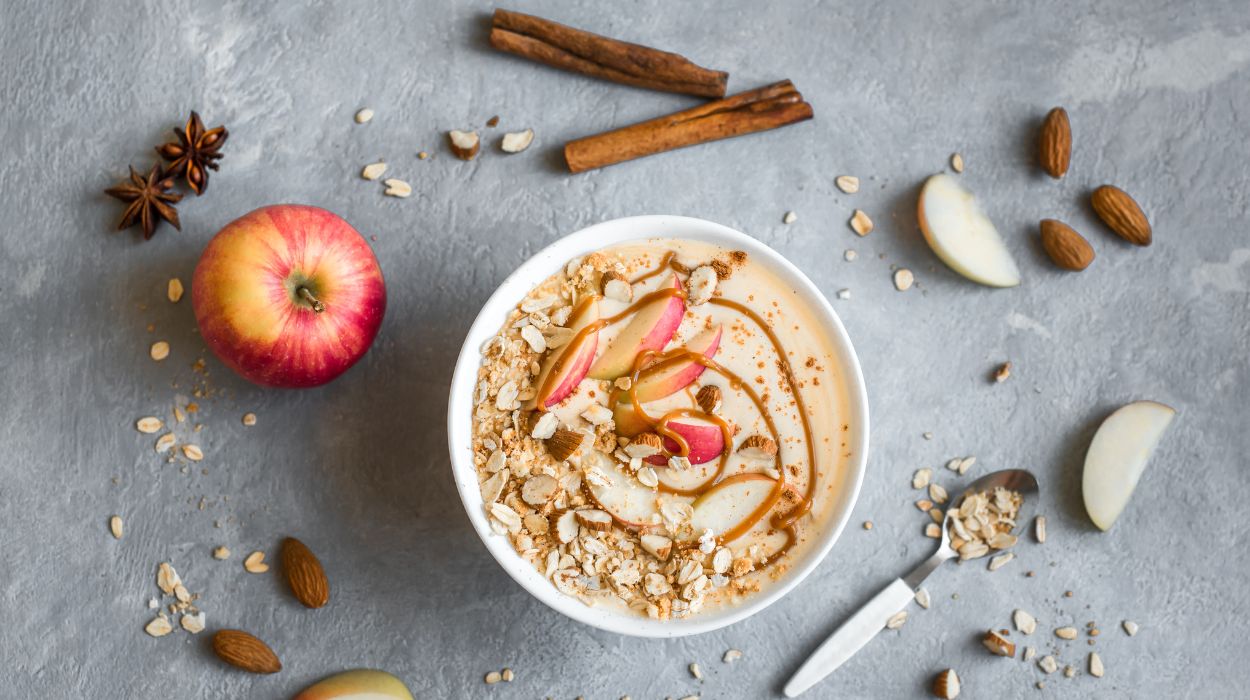 Expert's opinion
Expert's opinion
Expert's opinion
The article is a subjective view on this topic written by writers specializing in medical writing.
It may reflect on a personal journey surrounding struggles with an illness or medical condition, involve product comparisons, diet considerations, or other health-related opinions.
Although the view is entirely that of the writer, it is based on academic experiences and scientific research they have conducted; it is fact-checked by a team of degreed medical experts, and validated by sources attached to the article.
The numbers in parenthesis (1,2,3) will take you to clickable links to related scientific papers.
Does Cinnamon Help You Lose Weight 2024? Benefits & Risks Of Cinnamon For Weight Loss

Cinnamon is a versatile spice commonly used for strong flavor, exotic taste, and medicinal purposes. In the past, people used cinnamon as a remedy for respiratory and digestive diseases. Nowadays, it is popular to use drinks to lose weight. People are advised to drink cinnamon water and tea to promote weight loss. But really, scientifically speaking, does cinnamon help you lose weight?
Sure, cinnamon has health benefits, but it has risks too. Read through to learn how effective cinnamon is for weight loss. Also, you’ll discover other health benefits of cinnamon[1] and how to choose the cinnamon type to minimize the potential risk of consumption.
Is Cinnamon Good For Weight Loss?
Cinnamon’s effects on losing weight have been investigated in several studies, but the results are heterogeneous. A meta-analysis[2] of 16 studies showed that cinnamon supplementation resulted in less than 1 kg of weight loss. Weight loss was greater with doses of 2-3 gram (g) daily cinnamon supplementation and only significant in more than 12 weeks of long-term use. These studies showed that cinnamon could help weight loss in people with obesity, diabetes, polycystic ovary syndrome (PCOS), and metabolic syndrome.
Does Cinnamon Help You Lose Belly Fat?
Having belly fat, in other terms, having excess fat in the waistline, is one of the causes of excess visceral fat, or fat around the internal organs.
Waist circumference is an indicator of belly fat. Men who have more than 102 cm and women who have more than 88 cm waist circumference are considered to have abdominal obesity[3]. Meta-analysis of several studies[2] reported cinnamon supplementation decreased waist circumference in people with obesity, diabetes, PCOS, and metabolic syndrome, but the effects were just significant in female participants.
Is Cinnamon Tea Good For Weight Loss?
There is no scientific evidence on the fat-burning effects of cinnamon tea with or without honey. But, in a clinical study[4], 30 non-diabetic adults were given an oral glucose tolerance test (OGTT) with or without 100 ml of cinnamon tea. OGTT is a sugary solution given to patients to diagnose impaired blood glucose levels and diabetes. Participants having cinnamon tea with OGTT had slightly lower postprandial (after meal) blood sugar levels and significantly lower maximum glucose concentration.
Still, study results show just one-time use of cinnamon tea on blood glucose levels. So cinnamon tea is neither established nor the best way to boost metabolism.
Health Benefits Of Cinnamon
You’ll learn the health benefits of cinnamon, but first, you need to learn that not all cinnamon has the same benefits. The bioavailability of cinnamon may change if it is a cinnamon extract, bark sticks, or powder. The change in bioavailability is due to the use of different types of cinnamon which contain other plant chemicals known as phytochemicals.
Cinnamon May Inhibit The Activity Of Digestive Enzymes
Carbohydrates with a high glycemic index suddenly increase and then decrease blood glucose levels, causing increased hunger a short time after eating.
Studies on cell cultures[5] showed cinnamon inhibited the activity of digestive enzymes resulting in a reduced starch breakdown. This means cinnamon may affect carbohydrate digestion and glucose uptake, which could be one of the reasons for the anti-hyperglycemic effects of cinnamon.
Improve Blood Sugar And Insulin Sensitivity

Abnormal insulin and postprandial glucose blood glucose levels after eating a meal may be an indicator of obesity and chronic diseases such as diabetes and heart disease.
Cinnamon powder or extract’s effects on blood sugar or glycemia and hormone insulin levels have been investigated in many studies, especially in patients with insulin resistance, diabetes, and metabolic diseases.
A meta-analysis of 29 studies[6] showed that cinnamon powder or extract can significantly lower glycemic and insulin levels in mainly prediabetic and diabetic patients. Reductions in blood glucose and insulin levels were greater with a longer supplementation duration (more than 8 weeks) and a lesser dose of 1.5 g cinnamon.
Also, HbA1c and HOMA-IR levels were lower in patients taking cinnamon supplementation. HbA1c[7] shows average glycemic levels in the last three months, and HOMA-IR shows insulin sensitivity. Both are used for monitoring insulin resistance, and lower values indicate better results.
Lower Blood Pressure
A 2022 report to the American Heart Association[8] stated that death caused by high blood pressure rose more than 65% in ten years. Consistently high blood pressure increases the heart’s workload, which can lead to heart disease.
9 studies[9] investigated the effects of cinnamon supplementation with various duration (8-16 weeks) and various dosages of 1.2 to 10 g. Blood pressure was lowered with cinnamon supplementation in prediabetes, diabetes, and metabolic syndrome patients.
Improve Blood Lipid Levels
According to the National Institute of Health, patients with obesity, impaired blood glucose, or diabetes[10] have a higher risk of heart diseases due to increased triglycerides, total and LDL cholesterol, and decreased HDL cholesterol.
Analysis from 13 studies[11] concluded that cinnamon supplementation was effective in lowering blood total cholesterol and triglycerides levels but not in HDL and LDL cholesterol levels in patients with impaired glucose tolerance or diabetes.
Cinnamon Powder Can Show Anti-Inflammatory Properties
Many factors like environmental pollutants, injuries, and pathogens such as viruses and bacteria can cause inflammation. Short-lived inflammation is a natural response of the immune system, but long-term inflammation can be detrimental to the body.
Long-term inflammation[12] can cause autoimmune, gastrointestinal, and metabolic diseases and even cancer. Studies showed that cinnamon powder or cinnamon extract could lower blood inflammation markers[13], including C-reactive protein (CRP) and IL-6, in diabetes, obesity, and PCOS patients. Also, it can increase total antioxidant capacity, which is important in lowering inflammation. Obesity is a disease of inflammation.
How To Take Cinnamon For Weight Loss?
Consuming cinnamon just to aid weight loss is not a good strategy for long-term weight loss. But cinnamon is a versatile spice that you can use for fabulous taste in dishes and its health benefits. Cinnamon types have different tastes: sweet, spicy, bitter…
Here are 3 best ways to use cinnamon in your balanced diet:
- Add cinnamon to your spice latte, hot chocolate, or smoothies to give a bitter but at the same time sweet taste
- Marinate beef with cinnamon for a robust flavor
- Make cinnamon bars or bites with dry fruits like raisins or dates for healthy and satisfying snacks
Potential Risks Of Cinnamon Use
Even though cinnamon has some health benefits. It should be consumed in moderation. This is because cinnamon can contain high quantities of coumarin, which can cause health risks in the long term.

Coumarin In Cinnamon
Cinnamon contains coumarin, which is a compound found in some plants. Even a small amount of coumarin was reported to increase liver enzyme levels or damage the liver[2], although it is generally reversible.
There are several types of cinnamon[1]. The main ones are
- True cinnamon/Ceylon cinnamon/Mexican cinnamon (Cinnamomum zeylanicum)
- Indonesian cinnamon (Cinnamomum burmanni)
- Vietnamese cinnamon (Cinnamomum Loureiro)
- Cassia cinnamon/Chinese cinnamon (Cinnamomum aromaticum).
Is It Possible To Exceed The Limits Of Coumarin Use?
In the European Union, maximum coumarin levels in cinnamon-containing foods like cinnamon stars or rice pudding with cinnamon were limited in 2011. According to the German Federal Institute of Risk Assessment[14], adults (~60kg) eat 120 mg, and children eat 30 mg of cinnamon stars, which exceeds the tolerable daily limit of coumarin.
If Cinnamon Only Used As A Spice
An adult (~60kg) consumes 2 g, and the child consumes 0.5 mg of Cassia cinnamon as a spice to reach the tolerable daily limit of coumarin. That’s why it is crucial to choose a cinnamon type that contains low coumarin, like Ceylon cinnamon.
Food safety authorities reported that Cassia Cinnamon has high coumarin levels. According to the German Federal Institute of Risk Assessment, Cassia cinnamon should be carefully consumed in moderation. Thus, Ceylon cinnamon should be preferred in case of frequent use due to its lower coumarin levels.
Cinnamon Supplement For Weight Loss And Coumarin Intake
Cinnamon-based supplements may contain high amounts of coumarin depending on the type of cinnamon and the processing method. People who take cinnamon-based supplements should know the origin of cinnamon in these products since they can contain a high amount of cassia cinnamon powder.
Conclusion
Is cinnamon good for weight loss? Yes, cinnamon supplementation may aid weight loss in prediabetes, diabetes, metabolic diseases, and PCOS patients. However, the effects are very low compared to standard weight loss programs, which can be achieved through a healthy diet daily and regular exercise. Thus cinnamon for weight loss or fat burning should not be advised as a quick way to lose weight.
Cinnamon supplementation may lower blood glucose, lipids, and pressure, especially in patients with metabolic diseases. Also, it may reduce extreme menstrual pain and show anti-inflammatory properties.
Cinnamon should be consumed in moderation because of the potential risk of the high amount of coumarin. Ceylon cinnamon should be preferred over cassia cinnamon due to its much lower coumarin levels.
In the case of cinnamon supplementation, the origin of cinnamon should be checked, and Ceylon cinnamon should be chosen over other cinnamons.
+ 14 sources
Health Canal avoids using tertiary references. We have strict sourcing guidelines and rely on peer-reviewed studies, academic researches from medical associations and institutions. To ensure the accuracy of articles in Health Canal, you can read more about the editorial process here
- Pallavi Kawatra and Rajagopalan, R. (2015). Cinnamon: Mystic powers of a minute ingredient. [online] 7(5), pp.1–1. doi:https://doi.org/10.4103/0974-8490.157990.
- Zeinab Yazdanpanah, Azadi-Yazdi, M., hamid Hooshmandi, Nahid Ramezani-Jolfaie and Kwon, D.-S. (2019). Effects of cinnamon supplementation on body weight and composition in adults: A systematic review and meta‐analysis of controlled clinical trials. [online] 34(3), pp.448–463. doi:https://doi.org/10.1002/ptr.6539.
- Grundy, S.M., Cleeman, J.I., Daniels, S.R., Donato, K.A., Eckel, R.H., Franklin, B.A., Gordon, D.L., Krauss, R.M., Savage, P.J., Smith, S.C., Spertus, J.A. and Fernando Ferreira Costa (2005). Diagnosis and Management of the Metabolic Syndrome. [online] 112(17), pp.2735–2752. doi:https://doi.org/10.1161/circulationaha.105.169404.
- Bernardo, A., Maria Leonor Silva, Santos, E. and Fernanda, M. (2015). Effect of Cinnamon Tea on Postprandial Glucose Concentration. [online] ResearchGate. Available at: https://www.researchgate.net/publication/280229275_Effect_of_Cinnamon_Tea_on_Postprandial_Glucose_Concentration#:~:text=The%20data%20revealed%20that%20cinnamon,concentration%20(%20p%20%3C%200.05).
- Hayward, N.K., McDougall, G.J., Farag, S., J. William Allwood, Austin, C., Campbell, F., Horgan, G.W. and Viren Ranawana (2019). Cinnamon Shows Antidiabetic Properties that Are Species-Specific: Effects on Enzyme Activity Inhibition and Starch Digestion. [online] 74(4), pp.544–552. doi:https://doi.org/10.1007/s11130-019-00760-8.
- Emad Kutbi, Mohammad Hassan Sohouli, Somaye Fatahi, Lari, A., Farzad Shidfar, Maha Mari Aljhdali, Fai Alhoshan, Saad Saif Elahi, Hashem Ameen Almusa and Abu-Zaid, A. (2021). The beneficial effects of cinnamon among patients with metabolic diseases: A systematic review and dose-response meta-analysis of randomized-controlled trials. [online] 62(22), pp.6113–6131. doi:https://doi.org/10.1080/10408398.2021.1896473.
- Sherwani, S.I., Khan, H.A., Aishah Ekhzaimy, Hicham Benabdelkamel and Meena Kishore Sakharkar (2016). Significance of HbA1c Test in Diagnosis and Prognosis of Diabetic Patients. [online] 11, pp.BMI.S38440–BMI.S38440. doi:https://doi.org/10.4137/bmi.s38440.
- Tsao, C.W., Aday, A.W., Zaid Almarzooq, Alonso, A., Beaton, A., Márcio Sommer Bittencourt, Boehme, A.K., Buxton, A.E., Carson, A.P., Commodore-Mensah, Y., Mitchell S.V. Elkind, Evenson, K.R., Chete Eze-Nliam, Ferguson, J.F., Generoso, G., Ho, J.E., Kalani, R., Khan, S.S., Kissela, B.M. and Knutson, K.L. (2022). Heart Disease and Stroke Statistics—2022 Update: A Report From the American Heart Association. [online] 145(8). doi:https://doi.org/10.1161/cir.0000000000001052.
- Hadi, A., Campbell, M., Jalili, C., Makan Pourmasoumi, Ammar Salehi-Sahlabadi and Seyed Ali Hosseini (2020). The effect of cinnamon supplementation on blood pressure in adults: A systematic review and meta-analysis of randomized controlled trials. [online] 36, pp.10–16. doi:https://doi.org/10.1016/j.clnesp.2020.01.002.
- and, D. (2023). Health Risks of Overweight & Obesity. [online] National Institute of Diabetes and Digestive and Kidney Diseases. Available at: https://www.niddk.nih.gov/health-information/weight-management/adult-overweight-obesity/health-risks.
- Maierean, S.M., Serban, C., Amirhossein Sahebkar, Sorin Ursoniu, Serban, A., Penson, P.E. and Banach, M. (2017). The effects of cinnamon supplementation on blood lipid concentrations: A systematic review and meta-analysis. [online] 11(6), pp.1393–1406. doi:https://doi.org/10.1016/j.jacl.2017.08.004.
- National Institute of Environmental Health Sciences. (2018). Inflammation. [online] Available at: https://www.niehs.nih.gov/health/topics/conditions/inflammation/index.cfm.
- Zhu, C., Yan, H., Zheng, Y., Santos, H.O., Melahat Sedanur Macit and Zhao, K. (2020). Impact of Cinnamon Supplementation on cardiometabolic Biomarkers of Inflammation and Oxidative Stress: A Systematic Review and Meta-Analysis of Randomized Controlled Trials. [online] 53, pp.102517–102517. doi:https://doi.org/10.1016/j.ctim.2020.102517.
- Bund.de. (2023). FAQ on coumarin in cinnamon and other foods – BfR. [online] Available at: https://www.bfr.bund.de/en/faq_on_coumarin_in_cinnamon_and_other_foods-8487.html#:~:text=Coumarin%20is%20a%20flavouring%20substance,the%20effect%20is%20usually%20reversible.



